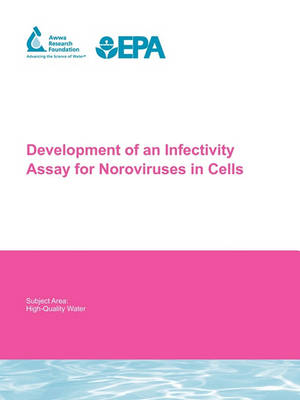Water Research Foundation Report
1 total work
Development of an Infectivity Assay for Noroviruses in Cells
by T. Straub, C. Nickerson, and Charles P Gerba
Published 14 July 2008
Noroviruses (NoV) are the leading cause of non-bacterial, self-limiting, gastrointestinal illness worldwide. The most important routes of norovirus transmission are via contaminated water and food, and secondary person-to-person spread is significant. Due to the importance of this family of viruses, Caliciviridae are listed on USEPA's Contaminant Candidate List (CCL-2). The USEPA uses this list of unregulated contaminants to prioritize research and data collection efforts to help them determine whether they should regulate a specific contaminant. Research on NoV occurrence and risks in municipal drinking water supplies has relied on reverse transcription real-time PCR. However, real-time RT-PCR methods may not provide an accurate assessment of the infectivity potential for these viruses. While this method can provide pathogen occurrence data to the USEPA and the water industry, viral infectivity assays provide the best evidence of the public health risks associated with pathogen detection in water supplies.
For NoV research, the problem has always been the lack of a suitable viral infectivity assay either in cell culture or animal models. This project sought to develop the first in vitro cell culture infectivity assay for human noroviruses, a U.S. Environmental Protection Agency Contaminate Candidate List (CCL-2) pathogen, isolated from source and drinking water supplies. Optimization of conditions for generating human physiological meaningful 3-D models of the small intestinal epithelium had been previously demonstrated for studies on Salmonella pathogenesis of the small intestine. Using this cell culture model, the research team tested a number of documented NoV outbreaks from cruise ships, nursing homes, and human challenge trials. Both Genogroup I and II strains were tested in this system to demonstrate robustness of the infectivity assay. Infectivity was assessed by light microscopy, transmission electron microscopy, hybridization of viral RNA inside cells, and conventional and real-time PCR. In addition, assays were conducted to determine if the viruses could be passed through cell culture.
For NoV research, the problem has always been the lack of a suitable viral infectivity assay either in cell culture or animal models. This project sought to develop the first in vitro cell culture infectivity assay for human noroviruses, a U.S. Environmental Protection Agency Contaminate Candidate List (CCL-2) pathogen, isolated from source and drinking water supplies. Optimization of conditions for generating human physiological meaningful 3-D models of the small intestinal epithelium had been previously demonstrated for studies on Salmonella pathogenesis of the small intestine. Using this cell culture model, the research team tested a number of documented NoV outbreaks from cruise ships, nursing homes, and human challenge trials. Both Genogroup I and II strains were tested in this system to demonstrate robustness of the infectivity assay. Infectivity was assessed by light microscopy, transmission electron microscopy, hybridization of viral RNA inside cells, and conventional and real-time PCR. In addition, assays were conducted to determine if the viruses could be passed through cell culture.
